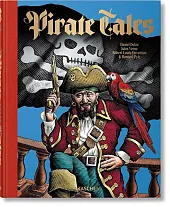Pirate Tales
Pirate Tales
Opis publikacji
In the imaginations of young and old alike, the word “pirate” resonates with spine-tingling fear and swashbuckling adventure. Over centuries, our cultural landscape has been populated by a host of famous real and fictional figures immortalized in literature and art: Edward Teach, also known as Blackbeard, with his fearsome reputation for cruelty; Henry ‘Bloody’ Morgan, whose treasure is still sought today; and of course Long John Silver, the archetypal anti-hero of Robert Louis Stevenson’s Treasure Island (1885). Pirate Tales gathers a treasure trove of excerpts from literary works inspired by the historical pirates of the 16th and 17th centuries. The edition begins with Daniel Defoe’s Robinson Crusoe (1719), a book containing all the trappings of pirate lore – shipwrecks, mutineers, undiscovered islands, and talking parrots – and one which influenced hundreds of works of adventure fiction,not least Jules Verne’s The Mysterious Island (1871). The third nerve-jangl...
In the imaginations of young and old alike, the word “pirate” resonates with spine-tingling fear and swashbuckling adventure. Over centuries, our cultural landscape has been populated by a host of famous real and fictional figures immortalized in literature and art: Edward Teach, also known as Blackbeard, with his fearsome reputation for cruelty; Henry ‘Bloody’ Morgan, whose treasure is still sought today; and of course Long John Silver, the archetypal anti-hero of Robert Louis Stevenson’s Treasure Island (1885).Pirate Tales gathers a treasure trove of excerpts from literary works inspired by the historical pirates of the 16th and 17th centuries. The edition begins with Daniel Defoe’s Robinson Crusoe (1719), a book containing all the trappings of pirate lore – shipwrecks, mutineers, undiscovered islands, and talking parrots – and one which influenced hundreds of works of adventure fiction, not least Jules Verne’s The Mysterious Island (1871). The third nerve-jangling novel is Treasure Island, without which no book on pirates would be complete, thanks to its unforgettable additions to the pirate canon: Blind Pew, Billy Bones, the black spot, wooden legs and Long John Silver. Extracts from Howard Pyle’s posthumously published Book of Pirates (1921) round off the edition.The tales are enlivened by arresting illustrations at every turn, including those by artists from the Brandywine School such as Pyle, the undisputed father of pirate illustration, and his students N. C. Wyeth and Frank Schoonover. This edition features a number of original artworks by these illustrators, drawn from private collections, as well as contributions by other artists from illustration’s so-called “Golden Age” of the late 19th and early 20th century. Scene-setting vignettes for each story were executed by the illustrator Michael Custode.


